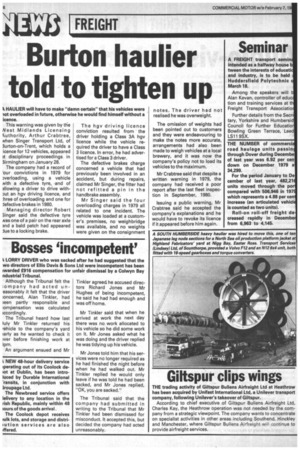Burton haulier told to tighten u
Page 18

If you've noticed an error in this article please click here to report it so we can fix it.
HAULIER will have to make "damn certain" that his vehicles were lot overloaded in future, otherwise he would find himself without a icence.
This warning was given by the Nest Midlands Licensing kuthority, Arthur Crabtree, tvhen Singer Transport Ltd, of 3urton-on-Trent, which holds a icence for 12 vehicles, appeared 3t disciplinary proceedings in 3irmingham on January 28.
The company had a record of 'our convictions in 1979 for werloading, using a vehicle ivith a defective tyre, and of 3 Mowing a driver to drive with)ut an hgv driving licence, and :hree of overloading and one for lefective brakes in 1980.
Managing director Robert Singer said the defective tyre Nas one of a pair on the rear axle 3 d a bald patch had appeared Jue to a locking brake.
The hgv driving licence conviction resulted from the driver holding a Class 3A hgv licence while the vehicle required the driver to have a Class 3 licence. In error, he had advertised for a Class 3 driver.
The defective brakes charge concerned a vehicle that had previously been involved in an accident, but during repairs, claimed Mr Singer, the fitter had not refitted a pin in the handbrake assembly.
Mr Singer said the four overloading charges in 1979 all related to one incident. The vehicle was loaded at a customer's premises, no weighbridge was available, and no weights were given on the consignment notes. The driver had not realised he was overweight.
The omission of weights had been pointed out to customers and they were endeavouring to make the notes more accurate, arrangements had also been made to weigh vehicles at a local brewery, and it was now the company's policy not to load its vehicles to the maximum.
Mr Crabtree said that despite a written warning in 1979, the company had received a poor report after the last fleet inspection in September, 1980.
Issuing a public warning, Mr Crabtree said he accepted the company's explanations and he would have to revoke its licence if it appeared before him again.












































































































